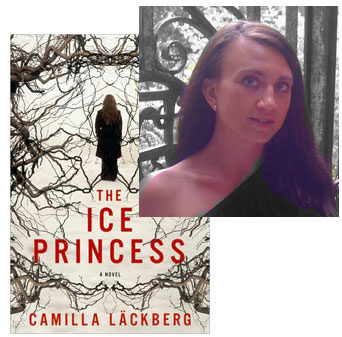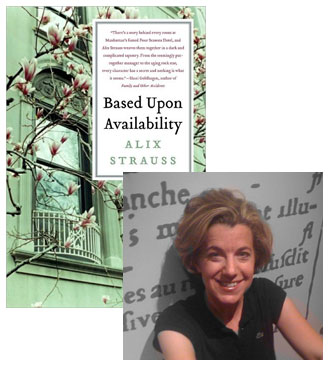Camilla Lackberg & The Creative Writing Assignment that Launched a Bestselling Crime Series
 “I was probably the unhappiest economist in Sweden,” Camilla Läckberg told me, recalling her life before she began writing some of that nation’s most popular crime novels. She’d always wanted to be a writer, she explained, “and one day my mother and my now-ex-husband got sick of hearing me talk about it, so they signed me up for a writing course… Before that, I just couldn’t believe how you would form all those words together; taking the course, the idea became more down-to-earth. It became a craft, a skill.” For one of the class writing assignments, Läckberg was told to write the first chapter of a book: “I didn’t have the idea before the course,” she emphasized. “It wasn’t something that had been with me for years.” But once the initial concept of a respected biographer who returns to her hometown after her parents’ death and soon discovers her childhood friend has been murdered was set down, it stuck with her, and two-and-a-half years later, she had finished The Ice Princess.
“I was probably the unhappiest economist in Sweden,” Camilla Läckberg told me, recalling her life before she began writing some of that nation’s most popular crime novels. She’d always wanted to be a writer, she explained, “and one day my mother and my now-ex-husband got sick of hearing me talk about it, so they signed me up for a writing course… Before that, I just couldn’t believe how you would form all those words together; taking the course, the idea became more down-to-earth. It became a craft, a skill.” For one of the class writing assignments, Läckberg was told to write the first chapter of a book: “I didn’t have the idea before the course,” she emphasized. “It wasn’t something that had been with me for years.” But once the initial concept of a respected biographer who returns to her hometown after her parents’ death and soon discovers her childhood friend has been murdered was set down, it stuck with her, and two-and-a-half years later, she had finished The Ice Princess.
Her debut novel landed with a small publisher and sold 3,000 copies—“not bad for a Swedish debutante,” she reflected—but not enough to quit her job as an economist for a cell phone company, either. So she found an agent who was able to place the sequel with a larger house; that book sold 30,000 copies, and by the fifth volume in the series, she was selling 200,000 copies in Sweden alone. (It helped that she’d also had two maternity leaves, during which she wrote two more books, those sales building up as her former career approached its conclusion.) The series now stands at seven books in Sweden, as The Ice Princess finally arrives to this country in an English-language edition this summer. Pegasus is publishing the first three books in hardcover, but less than a week after I met Läckberg during her visit to New York City for Thrillerfest, Free Press and Pocket Books announced they’d bought up the paperback rights to the initial triptych and would publish them in trade and mass market editions simultaneously.
“I always knew I wanted to write a series,” Läckberg said, “I love reading them, and as a writer it’s a wonderful opportunity to develop characters. I’ve been living with Erica and Patrik [the writer-turned-sleuth and her friend on the local police force] for so long, they’re like my friends now, I know them that well.” Because she conducted the interview in fluent English, I asked if she had any hand in the translation of her novels for this market. “I don’t have the rhythm for the language the way a native would,” she explained. “I don’t hear the fine tuning in the melodies of the language. And by the time I’ve finished a book,” she laughed, “I’ve proofread it about ten times already.” She is, however, on hand to help her translators sort out unfamiliar cultural concepts—which prompted me to ask about the various authors whose biographies Erica is said to have written. They’re real? I asked. Oh yes; “they’re the writers they force you to read in school because they’re Swedish classics,” Läckberg smiled.
22 July 2010 | interviews |
Alix Strauss: The Luxury Hotel as Literary Platform

It’d been nearly a year since the last time I saw Alix Strauss, which had been the launch party for Death Becomes Them, so I was delighted to meet up with her recently to chat about her second novel, Based Upon Availability—which is a bit like her debut, The Joy of Funerals, only “run backwards” as Alix puts it; where that book told the stories of several women and then tied up all the narrative threads with one longer story at the end, this one starts out with the story of Morgan, a manager at the Four Seasons in Manhattan, as she encounters a batch of women through the course of her work, then backtracks to explore what brought each of those characters to the hotel.
“I was fascinated by hotels and the idea of anonymity,” Alix said of the novel’s origins. “I love the idea that you could be anybody from anywhere, check into a hotel, and then the minute you check out, that room is wiped clean and any presence of you is erased.” Why the Four Seasons? “It’s signature, it’s branded, everybody understands it—there was that instant recognition of the hotel, but also an instant recognition of the kind of person who stays there.” For research, she spent a lot of time in the hotel’s lobby and restaurant, and relied on her previous experiences writing about it in a journalistic capacity, then spent a night in one of the rooms, “channeling” one of her multiple protagonists—in this case, a middle-aged rock star whose publicist has checked her into the hotel to go through withdrawal. “I ran around naked, had an unlit cigarette dangling from my lips, slapped on some fake tattoos, brought a bottle of vodka with me,” she recalled. “I ended up laying on the bathroom floor like my character does, trying to induce this psychotic lapse into inebriation and lunacy.”
So what does the Four Seasons think of its latest literary recognition? “I got a call from the PR person, who I’ve known for a number of years,” Alix told me. “She said, ‘We can’t stop hearing about this novel, can we get a copy?’ And that was a couple of weeks before it came out. I’ve not heard from her since… but I hope that they embrace it in the sense that it was meant, which was as a huge tribute to the hotel. Yes there are a lot of shenanigans that go on, but what hotel doesn’t have that?” In the meantime, she’s been doing readings in a number of other hotels in Manhattan and other cities; tomorrow night (July 21), for example, she’ll be at the Liberty Hotel in Boston.
20 July 2010 | interviews |

 Our Endless and Proper Work is my new book with Belt Publishing about starting (and sticking to) a productive writing practice.
Our Endless and Proper Work is my new book with Belt Publishing about starting (and sticking to) a productive writing practice. 
